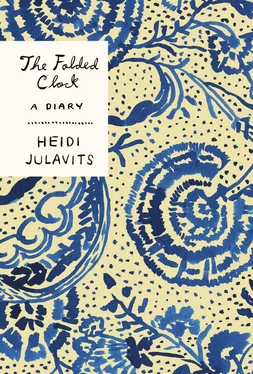Whatever. I was happy to fake it.
Since my parents did not share my wealth fantasy, I eventually discovered boys to be the quicker route. In high school I dated a boy with money, or what counted as money in my town. He wore torn sweaters and drove an Audi and was adept at stealing radar detectors from the country club parking lot, a talent I understood as his form of artistic expression because he was rich. He didn’t need to steal anything. (I was not wrong about his creative gifts; he would grow up to become a successful defrauder of insurance companies.)
After high school I fell in love with a rich boy from Virginia. (I didn’t fall in love with him because he was rich; he remains, other than my husband, the love of my life.) Through him I lived the rich life I’d dreamed my entire childhood of living, sort of. Richmond was no Greenwich. His family owned (I can still remember) two Audis, a Porsche, a Saab, and a BMW. They had a beach house, a hunting property, and a ski condo. That I loved him so much, and that his family was so warm and inclusive, meant that I fell into his world like a thirsty girl into a well. Every once in a while I’d poke my head out and wonder, What am I doing here? I couldn’t have a conversation with his female friends without faking an identity of assumed ease and privilege (and ease with privilege). These girls flew to London for the weekend to shop for debutante dresses. Their debutante parties were decorated by set designers from Cats . (They had debutante parties!) All of his friends went to Ivy League schools, even the self-admittedly dumb friends. Where I came from, being admitted to such schools was like winning the escape lottery, and many smart people I knew didn’t win, and ended up at the paper mill or a local community college. Every once in a while I’d call home exhausted and upset — upset by the amount of energy it took to fit in, upset that I cared to expend that energy in the first place. I think my parents were relieved by my periodic cracks. I imagine they otherwise thought they’d lost me to another planet, one to which theirs offered very infrequent shuttle runs.
Still, I loved this boyfriend; I was convinced I would marry him. This belief resolved certain anxieties and illogicalities (despite my desire to be rich, I wanted to be a novelist). Of the many pressures I felt as I one-eye squinted toward adulthood, the pressure to support myself, or the question of how I would do so over the long term (and in the manner to which I was newly accustomed) was not one of them. It’s not as though I lost my drive. I made good grades because I always did. I overachieved because I always did. I got grants and pursued non-remunerative careers because that’s what interested me. But to know in the back of my mind that I would always have a very nice place to live, and money to eat in very nice restaurants and to buy very nice clothes and to go on very nice vacations, well, this was extraordinarily calming to me.
At a certain point, however, wealth — not money but lots of money —started to represent, ironically, the inverse of possibility. It seemed oppressive; it changed people’s circuitry. One summer, my boyfriend and I accompanied his family on a trip to Spain. We ate every meal with his family. His parents and I talked more than was advantageous, if we wanted to remain fond of one another, about important matters. His father was conservative; he was also extremely perceptive, altruistic, and intelligent, which these days does not go without saying. He’d grown up with nothing; he was a self-made man. Still, it was wearing and occasionally enraging to tussle with him on political and social topics while I was staying in the villa he’d paid for, and eating the many fancy meals he paid for. I felt guilty that I experienced anything other than gratitude toward him.
Two years later, my relationship with my boyfriend began to falter. I’d like to claim that this faltering had nothing to do with the fact that, once I hit my early twenties, I no longer fantasized about being rich. (I fantasized, at most, about being able to pay my bills. This seemed ambition enough where money was concerned.) Soon I would be dating a broke PhD student with a disregard for money so entrenched that he would spend a semester living rent-free in a tent pitched on the concrete floor of a friend’s garage. I learned to be a different person through him, and maybe I accomplished this on my own, but it doesn’t, even at a remove of a few decades, feel that way. I needed guidance. I was still at that point where a boyfriend was an opportunity to try out different identities, not just an opportunity to have sex and be loved. As my male friend in graduate school once said, “Men want a relationship, but women expect a world .” I don’t think, in other words, that my expectations were atypical, or that I was atypically using men as a means to better, or simply alter, because my goals had changed, my circumstances. According to this friend, I was behaving like every other woman he knew. I’ve never considered whether or not I provided the men I dated a new identity to try out. What would it have been? I was blonde and clever and fun, but I can’t imagine that I changed a man’s world as they often changed, or promised to change, mine.
Today I went looking for Sanchez again. Again I could not find him. Sanchez is a legend in this town, at least among decorators and used furniture salesmen. Sanchez is a reupholsterer and an impossible man to locate. I’m looking for him because I have a couch that needs reupholstering, and reupholstering, I’m starting to suspect, is a dying art, like blacksmithing or coopering. Sanchez might be dead himself. His cell numbers, the four I’ve got, are all disconnected.
I could just buy a new couch, but then again I can’t. This couch has history. It is an heirloom of sorts, proof of the people my husband and I once were. Once we were people who cared about, granted, possibly the wrong things. We cared about couches. We wanted to stake our claim as interesting individuals by owning a highly unique couch. Then we became enlightened, or resigned. The couch’s purpose shifted. It became defiled. Now it is used as a napkin by our children. For the past nine years, this piece of furniture has wiped mouths and hands and absorbed milk, all kinds of milk. This possibly makes the couch sound more disgusting than it really is, though in truth it is pretty disgusting. This possibly makes us sound like parents without boundaries, because who lets their children drink milk on a blue velvet couch which, when stained with milk, to be perfectly candid, looks as though people, and the assumption would be “we,” have had lots of sex on it? And now we expect our guests to sit on this couch, atop these stains, while eating olives and cheese?
I know people often fail to find disgusting or shameful the revealing grime and sloth of their own lives. My friend with the apartment covered, quite impressively evenly, with a layer of dog fur, makes no excuses for her dog or for herself. My friend with the kitchen that stinks of compost from a filthy plastic bucket kept next to the stack of clean dishes. My friend with the long black hair (not her hair — whose hair is it?) cemented by dried toothpaste globs to the bathroom sink. These people are not apologetic. I am apologetic. They are not trying to cover up anything, as I am trying, quite literally, to cover up the daily evidence of our poor judgment, our pure exhaustion. That’s what this couch is. A sign of exhaustion. I would rather not be needed for two consecutive minutes than have a beautiful couch. I would rather search for coats I don’t need on eBay while milk is spilled than have a beautiful couch. I let the couch go because I felt confident that people like Sanchez existed in the world. Once I recovered my energy and my standards, I could enlist a Sanchez to reinstate my former self. No slip is permanent, right? But I can’t even leave him a message asking for his help. I can’t even hope that he’ll return my call.
Читать дальше












